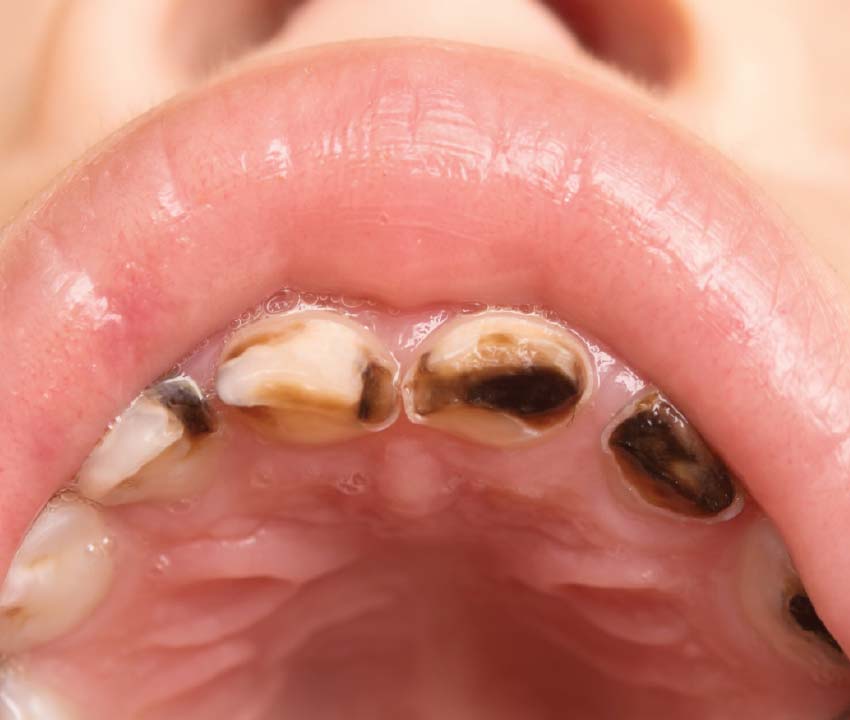Do Babies Get Tooth Decay?
Decay in Primary Teeth Can Have Long-Lasting Effects
Dear Doctor,
My 10-month-old has only 5 teeth, but the pediatrician says I should schedule a dental appointment for him soon. What’s the rush?
Dear Crystal,
A baby’s smile is a heartwarming sight, even if only a few teeth are showing. It might seem premature to worry about tooth decay, but the reality is that anyone who has teeth has the potential for tooth decay. In fact, tooth decay is the number one chronic childhood disease around the world. It can happen soon after teeth erupt (break through the gums), and it can spread with alarming speed.
 |
Even though primary (baby) teeth are not permanent, they are important—for chewing, for speech, and especially as placeholders for adult teeth. If some baby teeth are lost early due to decay, adult teeth may be crowded or crooked. What’s more, young children who experience tooth decay are much more likely to have cavities in their permanent teeth.
Recognizing a Troubling Condition
Early Childhood Caries (ECC) is the official name for tooth decay in children under age 6. One quarter of U.S. children suffer from ECC, with poor and minority children at highest risk. ECC can progress quickly and dramatically in primary teeth since the enamel is thinner and more susceptible to decay. Within months, it can spread from the outer tooth enamel to the soft inner dentin. It can also infect healthy teeth, leading to a mouth full of cavities and putting permanent teeth at risk. Advanced ECC can be painful and may require extensive dental treatment, including surgery. In addition, it can lead to ill effects on nutrition, growth, speech and self-esteem.
The first sign of ECC is usually white spots around the gum line, which can later become yellow or brown patches. But tooth decay is not always easy to see, and it does not go away by itself, so it’s important to have your baby examined by a dentist. The American Dental Association, the American Academy of Pediatric Dentistry and the American Academy of Pediatrics recommend that babies visit the dentist within six months of getting their first tooth, and no later than their first birthday.
What Causes Early Childhood Tooth Decay?
Another term for ECC is “Baby Bottle Tooth Decay.” When babies fall asleep with a bottle of anything but water in their mouth, the liquid can pool around their teeth, leading to tooth decay. In addition, drinking liquids that contain sugar throughout the day—including milk, formula and 100% juice—and extended use of a “sippy cup” are associated with early childhood caries.
Here’s how it happens: Bacteria in the mouth feed on the sugars in the liquids, producing acids that start to eat away at the tooth’s surface. Acid can also come from sugar and starch in food, and from using a sweetened pacifier or taking sugary oral medicine on a regular basis. The tiny holes that develop in the tooth’s surface are called caries, or cavities.
The cariogenic (decay-causing) oral bacteria (an oral biofilm) produce acid, and thrive in an acidic (low pH) environment. Babies don’t have these bacteria in their mouths at birth. However, they can be passed from a caregiver’s saliva to a baby by sharing food, cups and utensils, by kissing babies on the mouth, or when babies put their fingers into someone else’s mouth and then into their own.
Preventing Early Childhood Tooth Decay
Tooth decay in babies is largely preventable. Here are some tips to protect your child:
- After feedings (including nighttime breastfeeding), wipe your baby’s teeth and gums with a clean, damp cloth.
- As soon as your baby has teeth, gently brush them twice a day with a baby toothbrush and a rice-sized dot of baby toothpaste with fluoride. (Although fluoride prevents cavities, using too much while enamel is developing can cause the enamel to become discolored.)
- Don’t let babies and toddlers fall asleep with a naptime or bedtime bottle in their mouth. Also, avoid nursing a baby to sleep.
- Limit snacking and drinking times. Continuously snacking or drinking throughout the day creates more opportunity for bacteria to convert starches and sugars into enamel-dissolving acid. When children are eating solid food, limit milk to mealtimes and stick to water other times.
- Aim to move to a cup by the baby’s first birthday—but note that prolonged sipping of anything other than water can lead to tooth decay.
- Don’t drink from baby’s cup, put utensils or pacifier in your mouth or kiss your infant on the lips: These behaviors can spread your oral bacteria to the child. Take care of your own oral health to reduce harmful oral bacteria that may spread to your baby.
- Never dip your child’s pacifier in sugar or add sugar to your baby’s food.
While prevention is best, the good news is that baby tooth decay is often reversible if treated quickly. A baby’s smile is a precious sight. Keep that smile healthy by preventing childhood tooth decay, starting in the earliest stages of life.



